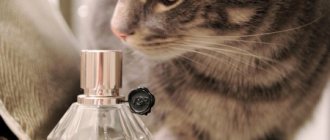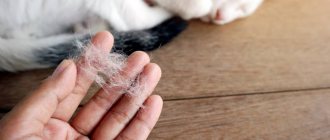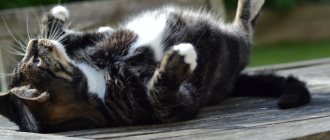An Arsenal of Cats' Unloved Smells
Despite developed vision, the sense of smell is also important for furry pets. Thanks to the ability to distinguish smells, cats are perfectly oriented in their surroundings, mark their territory and communicate with each other.
All odors surrounding your pet can be divided into several categories:
- Pleasant. So, the smell of sweat on the owner’s clothes calms the cat, she knows that he is nearby. Catnip and valerian excite, as they are similar to the hormones of furry pets. Also read about grass for cats.
- Repelling - any strong aroma has a repulsive effect, and there is a direct dependence on the intensity - the higher it is, the more unpleasant the smell.
Using this feature, you can use different scents to teach your cat good manners or wean them from bad ones.
Products are herbal or artificial based.
Also read: Why cats are afraid of water.
Plant-based sources of unpleasant odors
Such means include:
- Garlic and onion cloves. They secrete phytoncides that irritate the nasal mucosa, which forces the animal to move as far as possible from the source of the unpleasant odor. To enhance the effect, it is recommended to finely chop or grind to a paste-like consistency. Prepared portions of onions and garlic should be placed in places that are subject to “attacks” from your pet. But it is important to consider that the aroma from these products is strong and will be noticeable not only to animals, but also to people. As the specific odor disappears, it is worth replacing with a fresh portion.
- Any spices: cinnamon, coriander, pepper, curry, etc. make your pet want to run away. They can be used in several ways: rub surfaces or make a mixture based on them. Add 1-2 teaspoons of spice to 200 ml of water, stir and spray on areas that need protection from animals.
- Oil from the leaves of the rue bush works well to repel furry pets. A few drops applied to problem areas will help in weaning from bad habits.
- Many essential oils have similar effects. Lavender or rosemary based oil applied to surfaces will repel the animal.
- All citrus fruits (orange, lemon, tangerine, etc.) will help cope with your cat’s bad habits. The smell of lemon is especially unpleasant for them, but the rest are difficult to tolerate. You can also add juice to water and use a spray bottle to treat surfaces or place fruit slices in the right places. The animal will avoid them.
- The smell of coffee is also hated by cats, which can be used to your advantage.
To eliminate the unpleasant odor and wean the animal from shitting in inappropriate places, you can use a combination of some of the above remedies.
For example, pour lemon juice over coffee grounds or sprinkle with essential oil and place in the right place. Living lavender or rosemary plants placed on the windowsill will wean your pet from spoiling other plants nearby.
Perfumes and special products
Any product from the perfume industry, be it expensive perfume or cheap deodorant, has an equally repulsive effect on cats. The stronger the smell, the more disgust it causes. If the composition contains the aroma of citrus or lavender, this will enhance the effect.
Vinegar is extremely unpleasant for cats; you can add 2-3 drops to water and wipe the surfaces that need protection. People will not feel a special aroma from such a concentration, but this will be enough to scare away the animal.
Pet stores provide a fairly wide range of factory-produced sprays and liquids to wean cats from bad habits. For example, the spray “Repel? Yes!" or "Biovax". They contain special fragrances and enzymes that help in the fight against pet leprosy.
Also read the article: Antigadin for cats.
Features of smell in cats
Cats use their sense of smell not so much for hunting as for social interaction.
Urine, secretions from glands located on the muzzle and near the anus, sweat left by paws on the path - all this carries for the animal a lot of detailed information about other cats living in this territory: their claims to dominance, readiness to mate, state of health , moving around the territory, etc.
60–80 million olfactory cells help cats perceive a subtle and rich range of aromas (humans have only 5–20 million). In addition, these animals have a special organ called Jacobson's tube: two narrow canals that begin behind the upper incisors. To sense the smell with their help, the cat usually slightly opens its mouth.
A cat's olfactory system is different from a human's.
There are several versions about the main purpose of the Jacobson tube. In particular, it is assumed that animals with its help:
- “analyze” the chemical composition of food;
- looking for sexual partners;
- detect subtle chemical changes in the air that anticipate cataclysms such as earthquakes or volcanic eruptions.
It is not surprising that a cat can clearly perceive odors that a person cannot even smell, and that some aromas that are pleasant to humans may seem too harsh and strong to the animal.
How to use “aromatherapy” to rid entryways of cats
If there is a street cat in the entrance, then it causes a lot of problems. Among the most common are: an unpleasant odor from the animal’s urine and feces, “screams” in the middle of the night and the rotting remains of half-eaten food. But you can get rid of uninvited guests in the form of cats using their dislike for certain scents. They evoke in animals an instinctive feeling of danger, anxiety and fear, forcing them to get out of their favorite entrance.
Essential oils and vinegar can best help with this. Since the entrance is a fairly large area, it will be more convenient to treat it with liquid.
To prepare it, take water and add a few drops of vinegar or any essential oil (preferably lavender or citrus), pour it into a spray bottle and spray it on the walls and floor of the entrance.
This will get rid of uninvited residents.
Industrial products
On sale you can find sprays designed to discourage a cat from any place. Their effectiveness, as in the above cases, largely depends on the individual characteristics of the animal.
These products should be used carefully if there are elderly people, asthmatics, or children under three years of age in the house. They can also harm small animals and birds.
Happy cat Antipakostin
Spray made in Japan, bottle volume - 200 ml. Average price 600–700 rub.
Antipakostin is designed for dogs and cats
The main active ingredients are menthol, pepper extract and catechin (an organic substance of plant origin, found in green tea). Repels animals and eliminates unpleasant odors. Suitable for both cats and dogs. The product is sprayed directly onto the problem area.
Can be sprayed on wallpaper and furniture; it does not leave wet marks or stains. Checked! 100% suitable for weaning cats from tearing up furniture and wallpaper! To achieve the effect, I sprayed the mat itself once every two days! The cat ran from this smell like it was fire! After 2 weeks of splashing, the cat forgot the way to the mat! Now, even when he sees the bottle, he hides! From time to time I spray the product so that I don’t relax!
Dina
https://irecommend.ru/content/kak-bystro-otuchit-kota-gadit
Antigadin Api-San Best friend
Russian-made spray, volume 100 ml. The composition includes a synthetic perfume composition. Average price 160 rub.
Antigadin Api-San is created on the basis of synthetic fragrances
Initially, it is recommended to spray the product 2 times a day. After the animal loses interest in the problem area, the treatment is repeated weekly to consolidate the result. The bottle must be shaken before use.
The volume is large and lasts a long time. And the spray form is good, apply it and forget it. Doesn't leave any stains. Even if the place was marked more than once, after treatment the cats never went there.
Zorua
https://irecommend.ru/content/khoroshii-pomoshchnik-91
After a week of using this wonderful product twice a day, I watched as the cat, immediately after spraying the spray, went to sharpen its claws on the wallpaper. She didn’t care at all what I sprayed there.
ElenaDiachkova
https://otzovik.com/review_5201172.html
Shit? No! BioVax
Spray lotion made in Russia, volume 150 ml. Average price 110–140 rubles.
The composition includes natural essential oils and red pepper extract. An allergic reaction is possible, as the manufacturer himself warns about. When spraying for the first time, special care must be taken.
Due to the extract of red pepper, the product has a strong odor
On the first day, the forbidden area is sprayed with the product 2-3 times, then the procedure is repeated 1-2 times a day until the animal acquires a reflex.
The older cat really didn’t like the smell, she immediately ran away and then was very unhappy and offended. The little one didn’t like it either, everyone squinted and ran away as soon as they took out the bottle. At first, the little one showed pressure and still walked past, even to the place where the product was applied, but over time this problem disappeared, and now everyone goes where they need to go, the main thing is to spray more often. BUT there are some disadvantages: after spraying, it really interferes with sneezing and coughing, and even the citrus aroma doesn’t help.
Maboroshi
https://irecommend.ru/content/na-chetverochku-foto-spreya-sostavai-koteek
Beaphar Stop-it Cat
Spray 100 ml, country of origin - the Netherlands. Average price 600–700 rub.
This product should be sprayed in a ventilated area.
The main active substance is methylnonyl ketone, a synthetic oil that irritates the upper respiratory tract of the animal. If the dosage and instructions for use are violated, it causes discomfort in people.
Use only in well-ventilated areas.
Among the advantages of the product: 1) there were no stains left on the wallpaper (our wallpaper is light) 2) the cat began to avoid this corner (even when the smell of the product had disappeared). But it should be noted that the product has a specific “chemical” smell. If there are small children in the house, then do not spray in front of them. And it’s better to go out for a walk and get some air later.
Agatha
https://irecommend.ru/content/esli-kot-deret-oboi-stop-it-cat-vash-spasitel
Antigadin Stop-it-cat did not have the expected effect on our cat. He both marked our new carpet and continued to mark it after the Stop-it-cat treatment. And therefore we have no satisfaction from purchasing this expensive product.
OsaKsenia
https://otzovik.com/review_4270325.html
Mr. Fresh. Weaning off shitting
Product made in Russia, volume 200 ml. Average price 150–200 rub.
The product has a pronounced citrus scent
The spray has a citrus scent. For ease of use, a spray gun is provided.
I immediately liked the sprayer - it covers most of the surface. There is no strong smell left from this product, at least when compared with others. It smells a little like alcohol, but the smell quickly disappears and is not even noticeable. This product helped literally right away! The cat stopped marking in the house altogether! It was enough for me to spray the places where he was marking once and it worked immediately!
Lime-Lemon
https://irecommend.ru/content/udobnoe-i-ne-dorogoe-sredstvo-bez-ne-priyatnogo-zapakha
The smell is so strong and stinking that it reaches the rooms in the apartment, and being in the apartment is simply unpleasant and impossible. In this case, the cat, of course, avoids this place, but only for the moment while the smell is there, as soon as it disappears, everything returns to its place. This product has run out, but there are no changes.
nana8
https://irecommend.ru/content/uzhasnoe-sredstvo-48
Repelling cats when they defecate on the bed
Pets bring not only joy to their owners, but also inconvenience, starting to “misbehave” in the apartment, for example, by choosing a secluded place in the bedroom that is not intended for the toilet.
Before you start weaning your animal from such an unpleasant habit, you need to find out why it does it. Among the main reasons for this behavior are:
- Protest. When a pet is scolded or punished for something, it develops stress, and with such behavior the animal shows its disagreement.
- If there are problems with the genitourinary system, the act of emptying the bladder can be painful and the cat looks for a more comfortable and soft place for the toilet.
- Young kittens are often afraid to get out of bed on their own or do not remember where the toilet is, which leads to bowel movements in the bed.
- Some especially clean individuals do this when their tray is full; you should pay attention to the regularity of changing the filler in it and the problem will be solved.
- Cats whose owners are rarely at home or pay little attention to them begin to get bored and try to attract attention and diversify their lives with this behavior.
- Many elderly pets, having lived in a family for a long time, suddenly begin to shit on the bed. This is not due to a deterioration in character, but to the aging of the body; the animal could simply not have time to reach its tray in time.
- Cats are terrible owners, and the bed smells like the owner; by peeing on it, they mark their territory.
Dealing with “indecent” pet behavior
Having understood the reasons for this behavior of your pet, it is much easier to understand what motivates him at the moment of dirty tricks and begin to fight it. In order to minimize stress, you should be more attentive to the animal, caress it, and play more. Keep the toilet clean and wash it more often, install additional trays with other types of litter.
You can use essential oils or wash clothes with a fabric softener that has a lavender or citrus scent. But it is worth considering that not only people, but also animals have allergic reactions, so you should use the products carefully. A few drops of oil can be applied to the bed frame.
It is possible to wean an animal from the bad habit of relieving itself on the bed with the right tactics.
Reasons for scaring away an animal
There are a large number of possible reasons why a cat needs to be kept away from a certain area. This usually happens if the pet:
- got into the habit of going to the toilet in the wrong place;
- chews wires or other objects;
- sharpens claws on wallpaper or furniture;
- leaves wool on clothes;
- spoils plants in the garden, for example, eats them, tramples and breaks young shoots, digs holes, peels off bark with claws, jumps on thin seedlings;
- chews the leaves of indoor plants (especially dangerous if they are toxic) or breaks them, placing them nearby in a pot;
- climbs onto tables or shelves, knocking over and breaking things.
Sometimes it is necessary to discourage a cat from a certain place for the sake of its own safety: for example, if an animal that is not adapted to free walking tries to jump out of the window.
A common problem is a cat chewing or marking shoes.
There are often cases when you have to drive away foreign animals: for example, cats marking doors, someone else's aggressive pet that gets into the garden and abuses your pet or spoils plants, etc.
My parents once had to resort to scaring for altruistic purposes: a magpie built a nest in a tree near their window, and when a chick hatched in it, one of the neighbor cats got into the habit of climbing the tree, obviously trying to get it. The adult birds drove away the “invader” each time, but the parents were so worried about the magpie family that they decided to help.
The easiest way to scare an animal away from a place (or a specific thing) is with the help of smell: punishment for many cats is not only ineffective, but can also provoke a reverse reaction, that is, a desire for revenge. In addition, owners usually physically do not have the opportunity to constantly monitor the pet in order to prevent unwanted actions. Making it difficult for cats to access problem areas by not letting them into a specific room or covering outdoor plants with a net is sometimes impossible or simply impractical.
Mr. Cat warns: danger to people
Rut oil is an effective remedy in the fight against bad habits of cats. But you need to know that if it is used in excess, the owners may experience unwanted reactions from the skin:
- development of allergic scabies;
- the appearance of urticaria;
- signs of allergic dermatitis.
When using this oil, you should adhere to the rule - the less, the better.
How to protect plants from cats
When cats mark territory, a special secretion is released along with urine, which, when it gets on the leaves of plants and flowers, spoils them. Many animals like to sleep in beds and flower beds and organize a toilet there, digging up the soft soil. This causes a lot of grief to owners of plots and gardens. Scratched tree trunks don't add joy either. But it is possible to fight such hooligans. It is enough to plant along the edge of the plot or on the windowsill where there are flowers, onions or garlic.
Ornamental plants will also come to the rescue. For example, lavender, which will not only repel cats, but will also decorate the area.
1111
Rue
Based on numerous reviews from potential owners, we can conclude that it is possible to scare away a cat with the smell of such a plant, but it is not safe for the person himself. After all, rue is a fairly strong allergen, especially for young children.
But out of desperation, many owners still decide to use this plant. You can use both the oil of this plant and its branches, placing them around the cat’s habitat.
Herbs and spices
The smell of greenery can not only scare away the animal, but also drown out the fetid smell of cat hooliganism. Fennel oil or a freshly picked bouquet of dill will help the owner achieve positive results. It’s enough to simply rub the cat’s haunted area with fennel, and wash your clothes with a few drops of dill oil.
Every housewife has a bouquet of spicy spices in her inventory. Which include :
- Dry mustard;
- Coriander;
- Ground red or black pepper;
- Zira.
© shutterstock
Many owners use a good method to discourage the animal from its “favorite” places. Double-sided tape is glued to the floor, and the sticky strips are sprinkled with spices, piquant smells that cats don’t like.











